- Home
- Alex Archer
Death Mask Page 2
Death Mask Read online
Page 2
“Do you really want to waste time pretending you don’t know what I am talking about, Miss Creed?” the voice said. “Nine minutes. Ticktock. Ticktock. The more time you waste now, the less you will have to save your friend. Find the mask or your friend dies. Is that incentive enough for you? Twenty-three hours, fifty-one minutes.”
“You can’t expect me to find something that’s been lost for centuries in a single day. That’s impossible.”
“You better hope not, for Mr. Braden’s sake.”
“This is insane! I don’t have the first idea where to start looking...or what I’m even looking for. You can’t just say ‘Find it.’ I’m not a miracle worker!”
“Well, there’s one man here who is desperately hoping you are, Miss Creed. His life depends upon it. I will call you again in a few hours to see how you’re getting on. Godspeed, Annja Creed. Ticktock. Ticktock.” The camera zoomed in to focus on the clock in the middle of Garin’s chest, then panned up to his face. “Just in case you need reminding.”
Annja couldn’t look away.
Garin looked at her with dead eyes.
She wondered if he had been drugged or just beaten so badly he couldn’t focus.
His head slumped forward again. This time it stayed down.
Annja watched as the clock ticked down another minute. She had less than a day to save Garin, with no idea where to begin, no clue as to where he might be. Normally there was one man she’d turn to if she needed technology to help her find someone—Garin. He wasn’t going to be able to help her now.
She continued to stare at the screen, trying to learn as much as she could about the place he was being held, but there was precious little to be gleaned from it. The light was artificial, the walls behind him were bare brick. It could have been, quite literally, anywhere in the world.
Another minute passed by and she knew she had to do something; anything.
She’d wasted ten minutes of his life already.
Ticktock. Ticktock.
2
23:45—Madrid
“Annja? As much as I adore you, my dear, I adore my sleep much more.”
“This is work,” Annja said.
“A four-letter word,” Roux said. She could imagine the smile playing across his lips as he grumbled. He could be a crank at the best of times. “And not one of the more amusing ones.”
“Have you heard from Garin?”
“Not recently. Last week. Why?”
“I was just sent a link to a video chat. Garin was on the other end. There was a clock strapped to his chest and a bomb under his chair. He was in a bad way. Beaten bloody.”
“Couldn’t happen to a nicer chap.”
“This is serious,” she said. “In less than twenty-four hours that clock hits zero and the bomb detonates, taking Garin with it. That’s the threat.”
“I assume this is a kidnapping? So what do they want?”
She heard him moving around the château, talking with her as he made his way to his study.
“They’re asking for the Mask of Torquemada,” she said. It came out in a more matter-of-fact way than she’d expected. Everyone knew who Torquemada was—a Dominican zealot who rose up to become the first Grand Inquisitor of the Spanish Inquisition, rabidly anti-Semitic, the scourge of the Moors—but in all the stories she’d heard of his vile purge, there had never been anything about a mask.
“Good luck with that,” Roux said dismissively. “It’s been missing for more years than I can remember.”
“So there is a mask. But you were there, weren’t you? You and Garin.”
“I may have been,” Roux said, not giving anything away. “But I had other things on my mind than a mad Dominican obsessed with religious purity. I’d already had a lifetime of that. I was in France. It’s not like we had CNN giving us hourly updates as the atrocities rolled on, but yes, you heard things, obviously. It was easy to throw accusations around, and you know the old adages about mud sticking, no smoke without fire. People were willing to believe anything if it meant they were safe from the worst of it, that it couldn’t happen to them. Torquemada was a Christian zealot. He was the driving force behind maybe as many as two hundred thousand Jews fleeing Spain. His priests encouraged another fifty thousand to convert to Christianity. Though I use the term encouraged in its most liberal sense.”
“And the mask?”
“If it ever existed, buried with him.”
“So we’re just talking about a little tomb-robbing here. I guess I can deal with that. Wouldn’t be the first time. Where’s he buried? Do we know?” She had already forwarded the email to Roux, along with the link.
“Yes. It’s a matter of public record. Unfortunately, his grave was ransacked only a couple of years before the Inquisition was disbanded.” Meaning the task had already become exponentially more difficult than she’d thought it would be in the matter of a few seconds. “They took everything in the tomb. Burned his bones, mask, everything destroyed in an auto-da-fé. An act of faith.” He fell silent and she knew he was waiting for her, giving her the chance to respond and draw her own conclusions.
“Okay. Well... If it was destroyed, then that’s a death sentence for Garin, so I’m going to ignore that option for now and assume that the mask was stolen and is still intact. People are greedy. If it was worth something, someone might have taken it.” She took the old man’s silence as agreement. “Where was he buried?” It was a starting point. Nothing more than that. But it was better than sitting around waiting for inspiration to strike. Five hundred years was a long time, but Annja hoped the normal logic of a search would hold true: the best place to start looking for something that had been lost was the last place it had been seen.
“The Monastery of Saint Thomas Aquinas in Ávila,” he said. “I’ll join you there as soon as I can, but first I think I shall pay a visit to Seville.”
“What has Seville got, apart from a barber and some oranges?”
The old man chuckled down the long-distance line. “It’s where so much of it began, my dear. As you say, for want of a better place, why not start at the beginning? Seville is where the first of these so-called acts of faith of the Inquisition took place in a particularly grisly sacrifice. Six people were burned alive.”
“That’s barbaric.” The history of the Inquisition was fascinating in and of itself, but she’d never considered it for the show. There were plenty of human monsters from that time, without the need to invent others for public edification. Using religion and ethnicity as a means of population control turned her stomach. It didn’t matter if it was five hundred years ago in Spain, sixty years ago in Germany or twenty years ago in Rwanda. Genocide was one of the few horrors that didn’t lessen with time.
“Yes, it was. Just as all forms of human sacrifice are,” Roux agreed. There was a pause. He was obviously thinking. “I won’t touch down for at least three hours, even if I get airborne in the next thirty minutes. I’ll contact you as soon as I land. In the meantime, I’ll make a call. Garin isn’t the only one with a little black book. I know a guy...he might be able to pinpoint the IP address from the webcam. See if we can’t find a source. You look at finding the mask, I’ll try to find Garin—hopefully, we’ll meet somewhere in the middle. Twenty-four hours is a long time.”
“In politics, maybe. In kidnap and ransom? I’m not so sure.”
“Just concentrate on getting to Ávila. I’ll give my guy your details and have him meet you there.” Roux hung up without waiting for her response. There was no “good luck.” He was all business, which was exactly what she needed from him right now. There wasn’t a moment to lose. She pillaged the hotel room of anything useful, throwing a change of clothes into a backpack, then zipped herself into her motorbike leathers and headed down to the hotel’s underground garage.
The Triumph Rocket III Roadst
er was where she’d left it.
It was a beast of a machine. She loved it. Annja slipped her bag from her shoulder and stowed it inside one of the panniers, then straddled the bike. It was bigger and heavier than she was used to, but the Roadster had so much pent-up power as she gunned the engine, she couldn’t help but grin at the thrill when it roared to life beneath her. There were perks to being a celebrity of sorts: companies bent over backward in exchange for a little publicity. She was a great ad for the bike. As Doug said, there was something inherently powerful about a great bike and a leather-clad rider. He would have called it sexy. She liked to think of it as iconic. Giving the Roadster up when she left Spain was going to be tough. She intended to hit the open road and see as much of the countryside as she could before then.
The bike roared up the ramp and out of the garage, banking sharply as she took the turn into the street. She was strong, but still, the muscles in her shoulders and forearms tightened as she leaned to keep the bike upright. She opened up the throttle, slipping into the early-morning city traffic. In a car, the congestion would have been a problem, bumper-to-bumper impatient drivers trying to cut in and out of lanes. But even though the Roadster was designed for the open road, it was maneuverable enough to weave in and out of the snarl of vehicles.
She accelerated ahead of the traffic jam, hitting the lights just as they changed from red to green, and left the line of cars trailing in her wake. They couldn’t match the bike’s speed in these conditions.
A few minutes later, she was more than a mile outside of the city, but the road ahead was blocked by a pair of trucks struggling uphill side by side, slowly losing momentum as the incline increased, neither one prepared to slow down or change lanes in case they couldn’t make it to the top of the hill. A snake of frustrated drivers had built up behind them.
Annja didn’t have time to waste.
She leaned to the left, letting her weight steer the bike into the narrow space between the lanes, and raced toward the gap between the two trucks. Drivers vented their frustration at her gambit, but that voice and its damned “ticktock, ticktock” was all she could hear. Annja twisted the throttle hard. Her grip tightened as she leaned forward, and the rush of air battered her. Still, she accelerated, surging past the barely moving cars. A chorus of horns bade her farewell as she disappeared between the trucks, her shoulder blades inches from the high-paneled sides of both. The huge vehicles drifted closer together as she sped between them.
She caught a glimpse of one of the drivers in his wing mirror. There was no mistaking the panic in his eyes. She grinned, but realized there was no way he’d be able to see the expression through her helmet’s black visor, which, all things considered, was probably for the best. He veered away suddenly, widening the gap for Annja, who surged ahead of the trucks and into the freedom of the open road.
She hit a hundred and thirty-six miles an hour in a few seconds, topping out the engine. The landscape blurred in her peripheral vision. Annja kept her head down. Speed limits didn’t matter. She’d take the ticket, if the cops could keep up with her. Ticktock. Ticktock. It was just her and the road, but she didn’t have time to enjoy it. She only had eyes for the dashed line leading all the way to the horizon.
She could feel the heat of the engine through the leathers on the inside of her right leg by the time she pulled up outside the high stone walls of the Royal Monastery of Saint Thomas Aquinas in Ávila.
She’d ridden as if the devil was on her tail.
The journey hadn’t even taken an hour.
She checked her phone. There was a message from Roux’s hacker giving her the name of a café—Giorgio’s—and instructions to meet her there in forty-five minutes. The message was fifteen minutes old. That gave her half an hour to unlock the secrets of the Grand Inquisitor’s shrine.
Ticktock.
3
23:00—Ávila
Ávila, the City of Stones and Saints.
That was how the place was described in the tourist brochure Annja picked up from the dispenser just inside the monastery walls. Footsteps echoed deeper inside the medieval building. She thumbed through the leaflet. It was the standard tourist fodder, ready to guide her to all kinds of attractions inside the city. She was only interested in the monastery. She handed over five euros at the glass window and put the change in a tip jar for renovations. Annja couldn’t tell whether the look the young museum worker gave her was admiring or disapproving, but the way his eyes lingered was most certainly lacking piety.
She gave him a smile that raised the color in his cheeks and followed the sign that led inside.
The monastery consisted of two floors built over three cloisters, and according to the floor plan, the initial building had begun in 1482 but only been completed in 1493. She skipped through much of what came next, looking for the name Tomás de Torquemada. It would be too much to expect any kind of reference to a mask in the literature, but she found plenty of the usual tourist facts broken down for easy consumption. A simple engraving showed him in profile, bearing the familiar tonsure of a Dominican friar. He looked...ordinary. It was hard to believe she was looking at the man behind one of the most ruthless religious purges of all time. There were a few cursory details about the Inquisition and the fact that Torquemada had lived out his final days here, being buried within the grounds of the monastery five years after its completion.
Two elderly washerwomen busied themselves with mops, sluicing them across the stone floor of the cloister of Silencio. They worked in silence and Annja had no intention of making them uncomfortable by asking questions. She walked quickly across the wet floor, shrugging in apology to the women. There was no sign of anyone remotely official, which would have made asking questions easier. She worked her way slowly around the room, looking for any kind of visual clue in the decor.
“It’s quite plain compared to the Reyes cloister,” a man said behind her. She hadn’t heard his footsteps on the tiled floor.
Annja turned, expecting to come face-to-face with a monk. He wasn’t. Or at least he wasn’t dressed like one. He wore a lightweight charcoal suit with a matching shirt. “Sorry?”
“The Cloister of the King. You were looking at the ceiling?”
She glanced up at the vaulted Gothic-style ceiling above her, surprised that it hadn’t been the first thing to catch her attention when she entered the cloister.
“There was a beautiful mosaic in the dome, the work of a Mudéjar—a Moor who remained in Spain after the country began to be reclaimed for Christians—but it’s long gone now, I’m afraid. Lost to time and vandals. The Mudéjars kept their faith even though they couldn’t make their devotions publicly. Such a sad time for our country. Our great shame. And yes, I say that with no hint of irony, given who is buried next door.” He offered her a wry smile. “The word Mudéjar also refers to the style of architecture, but in this case the ceiling was the work of a single man, or so we have come to believe. Sadly, as I said, it has long since been lost. Of course, not all Moors remained faithful—many converted to Christianity. They were called Moriscos, but that was a title that came loaded with contempt and mistrust.”
So many Moors and Jews had been driven out of the country or forced to renounce their own faith under fear of death, and yet others were allowed to continue with their lives. But why? The cynical side of Annja wanted to say money. So often it came down to money. People bought their freedom with it. Was that what had happened all those years ago? The Mudéjars had paid off the Inquisition?
“Might I ask, are you planning on making a program about us?”
“Sorry?” she said again, running about three steps behind the man as he moved from subject to subject.
“You are Annja Creed, aren’t you? I may be speaking out of turn, but I rather hope you aren’t planning on featuring Friar Torquemada in an episode of your Chasing History’s Monsters. He was one, o
f course, but he was a very human one,” he said, holding out a hand. “Francesco Maffrici. I am the curator here.”
She smiled, shaking his hand. His palm was soft against hers. “No, no, this isn’t exactly work, more a personal interest.”
“Excellent, then anything I can do to help, I am at your service.”
“Well, obviously, I am interested in Torquemada, but not for the show.”
The man nodded, offering her a wry smile. “The man and the Inquisition. They provide our daily bread.”
“I can well imagine. Actually, I’m interested particularly in the Mask of Torquemada. I understand that it was buried with him?” She offered it as a question rather than a statement, inviting him to correct her.
“That rather depends on which version of the legend you want to believe.”
Annja was intrigued. Two legends meant a mystery. Not that she had time for one.
“It wasn’t uncommon for a death mask to be made to capture the features of the recently deceased. Generally they would use wax and plaster. And perhaps that was so with Torquemada, but then you have to ask yourself—why would something like that be buried with him? That’s not so much a legend as a rationalization. The second hypothesis suggests that a mask was cast in metal some time before his death so that others could act in his place while he was ill. It would have meant that anyone could have overseen the tortures of the Inquisition, making it clear that they were acting in his name. Of course, once he was dead there was no need for it. None of his successors found the need to follow his example. Perhaps they were not quite so driven to inspire fear or could more easily hide the delight they took in their work?”
“You think he enjoyed it?”
“Oh, absolutely. Without doubt. His interests lay far beyond driving non-Christians out of Spain. It might have begun that way, a means of driving Jews and Muslims out of our land, but it lit a fire in the dark places of his soul. In the earliest days of the Inquisition, the Moors and Jews were given the option to convert, which meant they were able to remain in the country as second-class citizens. Later, their conversion offered no protection. The Inquisition turned on them and on other minorities that were considered to be outside the teachings of the Bible.”

 Rogue Angel: Forbidden City
Rogue Angel: Forbidden City The Spider Stone
The Spider Stone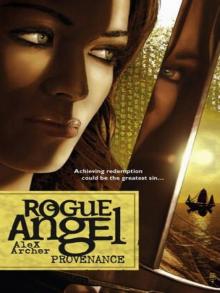 Provenance
Provenance Blood Cursed
Blood Cursed Fury's Goddess
Fury's Goddess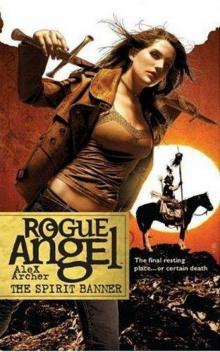 The Spirit Banner
The Spirit Banner Footprints
Footprints The Pretender's Gambit
The Pretender's Gambit Rogue Angel: The Lost Scrolls
Rogue Angel: The Lost Scrolls Staff of Judea
Staff of Judea Rogue Angel 55: Beneath Still Waters
Rogue Angel 55: Beneath Still Waters The Mortality Principle
The Mortality Principle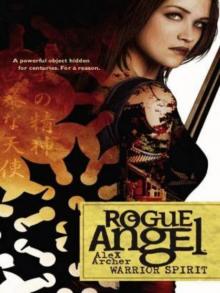 Warrior Spirit
Warrior Spirit Paradox
Paradox Tear of the Gods
Tear of the Gods Forbidden City
Forbidden City River of Nightmares (Rogue Angel)
River of Nightmares (Rogue Angel) Rogue Angel: The Secret of the Slaves
Rogue Angel: The Secret of the Slaves Destiny
Destiny Rogue Angel 51: The Pretender's Gambit
Rogue Angel 51: The Pretender's Gambit Celtic Fire
Celtic Fire Rogue Angel 54: Day of Atonement
Rogue Angel 54: Day of Atonement Day of Atonement
Day of Atonement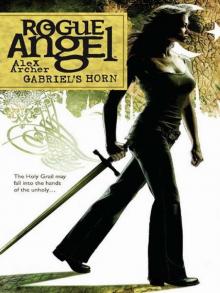 Rogue Angel: Gabriel's Horn
Rogue Angel: Gabriel's Horn Grendel's Curse
Grendel's Curse The Matador's Crown
The Matador's Crown Rogue Angel: The Chosen
Rogue Angel: The Chosen The Other Crowd
The Other Crowd Seeker’s Curse
Seeker’s Curse Rogue Angel 52: Death Mask
Rogue Angel 52: Death Mask The Golden Elephant
The Golden Elephant Blood Cursed (Rogue Angel)
Blood Cursed (Rogue Angel) Celtic Fire (Rogue Angel)
Celtic Fire (Rogue Angel)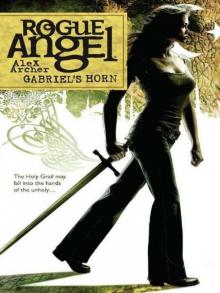 Gabriel's Horn
Gabriel's Horn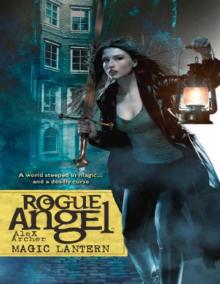 Magic Lantern (Rogue Angel)
Magic Lantern (Rogue Angel) God of Thunder
God of Thunder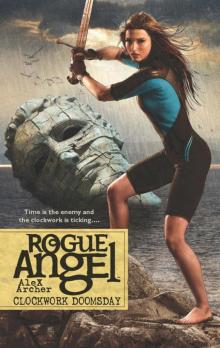 Clockwork Doomsday
Clockwork Doomsday The Bone Conjurer
The Bone Conjurer Treasure of Lima
Treasure of Lima The Soul Stealer
The Soul Stealer The Dragon’s Mark
The Dragon’s Mark Restless Soul
Restless Soul Rogue Angel: God Of Thunder
Rogue Angel: God Of Thunder Rogue Angel 49: The Devil's Chord
Rogue Angel 49: The Devil's Chord Death Mask
Death Mask Rogue Angel 46: Treasure of Lima
Rogue Angel 46: Treasure of Lima Swordsman's Legacy
Swordsman's Legacy The Oracle's Message
The Oracle's Message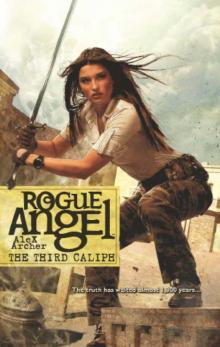 The Third Caliph
The Third Caliph Tribal Ways
Tribal Ways Phantom Prospect
Phantom Prospect Rogue Angel 50: Celtic Fire
Rogue Angel 50: Celtic Fire Library of Gold
Library of Gold Rogue Angel 53: Bathed in Blood
Rogue Angel 53: Bathed in Blood Sacred Ground
Sacred Ground The Devil's Chord
The Devil's Chord Serpent's Kiss
Serpent's Kiss The Vanishing Tribe
The Vanishing Tribe Sunken Pyramid
Sunken Pyramid Sunken Pyramid (Rogue Angel)
Sunken Pyramid (Rogue Angel)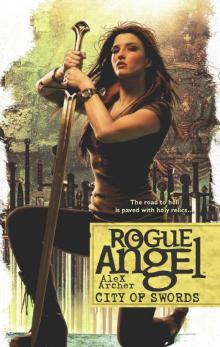 City of Swords
City of Swords Bathed in Blood
Bathed in Blood The Lost Scrolls
The Lost Scrolls The Babel Codex
The Babel Codex Mystic Warrior
Mystic Warrior Eternal Journey
Eternal Journey Beneath Still Waters
Beneath Still Waters Solomon's Jar
Solomon's Jar Beneath Still Waters (Rogue Angel Book 55)
Beneath Still Waters (Rogue Angel Book 55) Cradle of Solitude
Cradle of Solitude Secret of the Slaves
Secret of the Slaves River of Nightmares
River of Nightmares Polar Quest
Polar Quest False Horizon
False Horizon